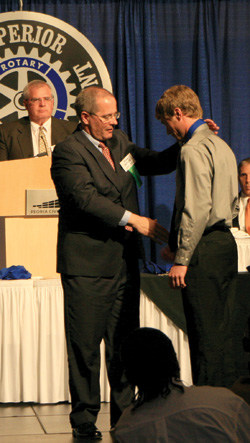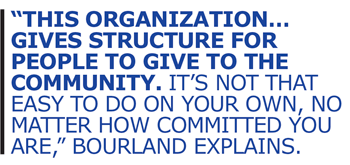The Rotary Club of Peoria celebrates a century of putting service above self.
“My first memories of Rotary are of my dad and his really hideous brown and orange, plaid jacket he wore every Friday,” declares Rebekah Bourland, vice president of UnityPoint Health – Methodist Foundation and longtime member of the Rotary Club of Peoria. “He just kept his Rotary pin on that jacket, and it was still there when he died. He really was committed to Rotary.”
Since 1913, hundreds of local professionals have demonstrated a similar devotion to Peoria’s downtown service club and its many volunteer endeavors. A family made up of three generations of Rotarians, the Bourlands have collectively witnessed several decades of the organization’s evolution, oftentimes blazing the trail of transformation themselves. Both Bourland’s father and grandfather, Bill Bourland and Fred Bourland, served as club presidents—just as she has. In fact, Bourland was among the earliest women Rotarians in the history of the international organization, and the Rotary Club of Peoria’s first female president.
Persevering through everything from radical social change and political upset to the ravages of war and economic crisis, the Rotary Club of Peoria has stood the test of time. This month, it celebrates its centennial anniversary, marking a century of commitment to bettering the community—and the world—by putting service above self.
A Heritage of Helping
Long before Bourland and other women joined the Rotary ranks, the organization began in 1905 as a men’s league in Chicago, with the Rotary Club of Chicago becoming the world’s first-ever service club. Rotary’s popularity spread quickly, and soon other clubs aiming to promote both fellowship and service began popping up around the country and the globe. By 1913, Rotary fever had spread to central Illinois, and after receiving encouragement from Chicago members, a group of 53 local businessmen organized the Rotary Club of Peoria. On June 2nd of that year, the International Association of Rotary Clubs granted the startup its 76th charter, making it one of the oldest of the nondenominational, nongovernmental organization’s more than 32,000 clubs in existence today.
Since then, the Peoria club has grown to include nearly 300 active members—making it the largest in its district—and sponsored more than a dozen other area Rotary clubs, including Peoria – North, East Peoria, Chillicothe, Morton, Galesburg and Bloomington. Though excluded from joining until the late 1980s, today, women make up a large part of the club’s membership, with many daughters and granddaughters—as well as sons and grandsons—joining and continuing longtime family traditions.
For a hundred years, downtown Rotarians have dedicated their time and effort to improving society through a variety of service activities, from hosting “Big Brother” outings and establishing scholarship funds to aiding local hunger programs, tutoring area students and more. Outside of central Illinois, Peoria members join the more than 1.2 million Rotarians worldwide in helping to support Rotary International’s goals of resolving conflict, treating and preventing disease—with a particular emphasis on polio eradication—increasing access to clean water and improving sanitation, improving child and maternal health, increasing literacy and access to education, and promoting economic and community development.
“It is strictly there to bring people and nations together for a common cause,” Bourland remarks. “To think that it was one person in Chicago, Illinois, who first had this concept, and that there are now… thousands of clubs around the world, that’s a very striking thing.
“I think it’s something that makes membership in this organization very attractive,” she continues. “Because no matter what our club is doing… if you are a person for whom service to others is important, you can find something within this club.”

Camaraderie and Community
“It’s anything you want it to be in terms of service,” adds Walter Ruppman, executive director of the Peoria Historical Society and the Rotary Club of Peoria’s current president. The 32-year Rotarian notes that “each club has its own personality,” and the bustling Rotary Club of Peoria offers many diverse volunteer opportunities that enable even the busiest ofprofessionals to network and support a cause they believe in. One such professional is Nick
Vespa, co-owner of Kelly Seed & Hardware Co., and at 38, one of the club’s youngest members.
As tending to the demands of running the family business makes it difficult to commit to a regular service program, Vespa appreciates the flexibility Rotary offers, allowing him to volunteer around his often-hectic schedule. But he always manages to carve out time to lend a hand at the club’s annual National Wheelchair Basketball Association banquet, as well as demonstrate to his son what it means to give back. “Having my son there… is just an absolutely amazing thing,” he explains. “You’re actually helping people, and you realize that it’s not [about] the material things. These people are so grateful for you just helping them with the smallest things.”
Like Bourland, putting service above self is a family tradition for Vespa, whose grandfather, Harold Church, was a member of the Rotary Club of Peoria for nearly six decades. “He loved his business and he loved the camaraderie that he had with his fellow Rotarians,” Vespa says of his late grandfather. That same camaraderie is what has kept Vespa coming to the club’s Friday meetings for the past three years. “It’s really nice to be able to have lunch, socialize and do good for the community with the people that you work with and see on a regular basis.”
Since its beginning, the club’s weekly meeting has doubled as a regular assembly of the “who’s who” of Peoria. Through the decades, community leaders from all walks of life have composed much of its membership, including many successful business owners, Fortune 50 CEOs, judges, mayors and congressmen. “You’ve got people within this club who have proven their commitment to the community,” Bourland notes, “and I think that has given the club a lot of longevity.”
In addition, Ruppman says, the club’s lunch program, which has featured high-profile speakers like U.S. Secretary of Transportation Ray LaHood, former Congressman Bob Michel and former Secretary of Defense Donald Rumsfeld, keeps members “in the know” on local and international issues and has played a major role in maintaining the club’s numbers over the years.
 “To me, it’s just the perfect combination of the world view and the local view that draws people to Rotary and makes this club different from many others,” Bourland adds. “Rotary offers the business person all those things you want. You want the connection… you want the communication, you want to be able to recognize the leaders in the community and call some of them by name, become a leader yourself… but you also have an organized way of serving the community without having to go out and find your own way to do that.
“To me, it’s just the perfect combination of the world view and the local view that draws people to Rotary and makes this club different from many others,” Bourland adds. “Rotary offers the business person all those things you want. You want the connection… you want the communication, you want to be able to recognize the leaders in the community and call some of them by name, become a leader yourself… but you also have an organized way of serving the community without having to go out and find your own way to do that.
“This organization… gives structure for people to give to the community. It’s not that easy to do on your own, no matter how committed you are,” she explains. “But when you belong to an organization like this… there are both expectations and opportunities for you to give to the community… It mobilizes people who might not otherwise be mobilized.”
Toasting a Century of Success
Throughout its hundred-year history, the Rotary Club of Peoria has demonstrated a commitment to improving quality of life and promoting goodwill, often with a focus on health, hunger, education and youth. For two decades, the club has forgone its regular buffet lunch for a simple soup and salad on the fourth Friday of each month—donating the nearly $6,000 in annual savings to area food pantries and hunger programs. Each year, in conjunction with other local Rotary clubs, it recognizes outstanding area high school seniors (those in the top eight percent of their class) at the Sterling Merit Awards Banquet, and grants a number of students the opportunity to attend college—providing more than $13,000 in scholarships each year. Many members participate in the club’s monthly reading program at Trewyn School, and the Rotary Club of Peoria Endowment Fund, established in cooperation with the Community Foundation of Central Illinois, allocates grants to several projects that benefit the community year-round.
This month, the club continues its benevolent tradition and celebrates its centennial with the debut of one of its largest projects yet: the Peoria Rotary Adventure Grove. Located adjacent to the Peoria Zoo and soon-to-be-completed Peoria Playhouse museum, the Adventure Grove will serve as a free, interactive and educational play area, featuring five animal- and insect-themed stations, storybook signage, and a Rotary wheel-inspired council circle. Club members raised $100,000, matched by the Peoria Park District, to construct what Ruppman proclaims will be the Peoria Rotary’s “legacy project for the next hundred years plus.”
Topping off the anniversary festivities, on June 14th, the club will host its “100th birthday party,” a special four-part dinner meeting paying homage to its heritage from 1913 to the present, and beyond. “It will celebrate the history, but then it will toast the future,” Bourland says of the event, which will commemorate each quarter-century of the club’s history with food, fashion and catchphrases of the eras—from the age of “distinguished gentlemen” and “Rotary Anns” to the days of groovy hairdos and casual Fridays.
The Human Connection
While the Rotary dress code, smoking policy and meeting location have evolved with the times, there’s one thing Bourland is confident will always remain the same: “There’s something about communication—face-to-face—over a meal, no matter how simple, that I just don’t think you can replicate.”
“It’s so impersonal these days,” Vespa adds. “There could be two people in the same room, and they’ll be texting each other on the phone instead of just talking… That’s what Rotary is about—getting involved, talking to people, and sitting down over a meal, having a conversation.”
Though the organization’s mission is focused on service, all three Rotarians agree the inherent fellowship Rotary fosters proves invaluable—especially to younger members, most of whom are fully immersed in the digital world. Whether it be a new connection, vital information on a local issue, or an opportunity to lend a helping hand, there is something for everyone—of any age—to gain as a Rotarian.
“This is still where it’s at in terms of building a relationship that’s a human one, and I don’t see how anything else gets done without that,” Bourland asserts. “I can’t see that anything will ever get done over the phone that will be equal to what is capable of being achieved by a group of people in a room of different backgrounds and different thoughts and different ages that all have the same desire—and that is a better place to be.” iBi
The Rotary Club of Peoria meets Fridays at 11:45am at the First United Methodist Church, 700 Main Street in Peoria. For more information, call (309) 676-5432, email [email protected], or visit clubrunner.ca/peoria-il.


